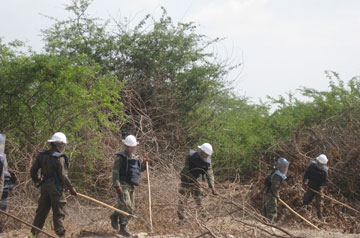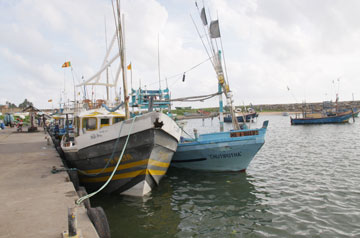|
Five years on since crushing LTTE terrorism:
Sri Lanka makes commendable progress
by K.M.H.C.B. Kulatunga
Sri Lanka has made commendable progress since LTTE terrorism was
crushed five years ago. No other country in the world had bounced back
so quickly after such a bitter experience.
 |
|
Demining using the raking method in Mullaithivu,
east of the A9 road. (File photo) |
 |
| The rebuilt
Azwer jetty in Jaffna |
Sri Lanka's laudable achievements during the past five years are even
more commendable when one considers the fact that the country's Security
Forces had to confront the most ruthless terrorist outfit in the world.
Even after the LTTE terrorist outfit was militarily defeated, many
other challenges had to be met. Apart from the resettlement of about a
half a million people in the North and the East, the Security Forces
faced numerous other tasks, including the demining of the area forcibly
held by the LTTE.
Most of the areas in which the LTTE ran its law of the jungle was
heavily fortified with hundreds of thousands of landmines. It was no
easy task to clear such a huge area inch by inch carefully minimising
injuries.
Resettlement
Though some Western countries exerted undue pressure on resettlement,
Sri Lanka could not rush things. As a responsible Government, every inch
liberated from the LTTE had to be checked and demined. Resettlement was
only possible after the Security Forces were fully satisfied that the
area was free of land mines.
Nevertheless, Sri Lanka's resettlement of displaced people was
completed in double quick time, setting new world standards. At the same
time, the Government ensured infrastructure facilities in the North and
the East with mega development projects in the two provinces.
Resettlement and development went hand-in-hand, opening new horizons for
those who had been liberated from the jaws of death.
When the LTTE was crushed by May 2009, all what the West had demanded
was a speedy resettlement process. But when Sri Lanka achieved that
Herculean task, setting new world standards in resettlement of displaced
persons, they talked about better facilities for the people in the two
provinces.
The Government gave preferential treatment to the Northern and the
Eastern Provinces over the other seven provinces. Billions of rupees
were spent on mega development projects in the North and the East, given
a new lease of life for those who were not even sure of their tomorrow
when they were under the LTTE.
As a result, fisheries and agriculture sector in the two provinces
thrived and cash began flowing to the North and the East as business
started flourishing. This resulted the Northern and the Eastern
Provinces showing an unprecedented growth rate of over 25 percent,
compared to the average overall growth of around seven percent.
Human shield
But some Western countries were totally blind to see this stark fact.
Instead, they came out with another strategy to exert pressure on Sri
Lanka.
They framed baseless charges regarding human rights violations during
the humanitarian operations. But what they spoke the most was the human
rights of LTTE terrorists killed in action. However, hardly anybody
uttered a word of comfort when people in the North and the East were
forcibly held as a human shield by LTTE terrorists.
The West found human rights as an effective tool to exert undue
pressure on Sri Lanka and also attempted to meddle in country's internal
affairs on the pretext of advocating on human rights and good
governance. The US-led Resolutions to the UNHRC were totally unwarranted
at a time Sri Lanka had been making a steady and determined progress
since the dawn of peace.
But certain Western countries cared more for the aspirations of the
LTTE rump and not that of the Tamils who have begun a new lease of life
after being freed during the humanitarian operation.
None of those external forces were there when Sri Lanka had been at
the receiving end. Lives of 21 million people were in total disarray,
without knowing when the LTTE terrorists would blast the next massive
bomb targeting civilians. None of those godfathers of human rights had
come to the rescue of those hapless civilians.
Problems
Now that Sri Lanka had waged its own battle and achieved peace due to
the supreme sacrifices of the Security Forces, enough and more
self-appointed advisors have emerged to advice Sri Lanka on
reconciliation and good governance.
Tamils in the North and the East had genuine problems in the past.
But those were not only confined to Tamils but also to Muslims and
Sinhalese living in the North and the East. People in the two provinces
had encountered various problems not because of their ethnic belongings
but due to their geographical locations.
Hence, there is no national problem or ethnic issue in Sri Lanka.
Those are innovated brand names give by the so-called Western peace
merchants. Leaders of Sri Lanka and its democratically-elected
Government know what is best for the people. No foreigner could have a
greater pain regarding the people in the North than our own leaders.
Some Western leaders shed crocodile tears on the plight of the Tamils in
Sri Lanka to woo votes of the Tamil diaspora in their countries.
Sri Lanka will find its own indigenous process for reconciliation and
does not need any outside expertise. It is we who fought our own battle
to get rid of the scourge of terrorism. Similarly, Sri Lanka is able to
make progress in reconciliation without any undue pressure from outside
elements. President Mahinda Rajapaksa and the Government have done
everything possible to find a better tomorrow for the resettled people.
Communal slogans
The people in the North and the East had suffered for three decades
due to LTTE terrorism. They do not demand police or land powers. It is
only the power-hungry TNA politicians who demand such powers for the
Northern Provincial Council. The police or land powers would not fulfill
any aspirations of the Tamils in the North.
Those are communal slogans for the TNA to portray itself as the sole
representative of the Tamils. People in the North have not forgotten how
the TNA was remote-controlled by LTTE leader Velupillai Prabhakaran when
Tiger terrorism was at its zenith. The TNA kept mum when the LTTE
terrorists shot dead Tamil civilians who had escaped from LTTE-held
areas for safety, seeking the protection of the Security Forces.
External Affairs Minister Professor G.L. Peiris told the Parliament
last week that President Mahinda Rajapaksa had clearly expressed the
view of the Sri Lanka Government to India that the devolution of police
powers to the Provincial Councils will bring about undesirable
repercussions.
The minister made this observation in Parliament in response to a
special statement made by Opposition Leader Ranil Wickremesinghe under
Standing Order 23(2). Minister Peiris said that the President expressed
his views to Indian Prime Minister Narendra Modi during a cordial and
informal discussion held during the President's visit to attend the
swearing-in ceremony of the newly elected Indian Prime Minister.
Fishermen's dispute
The minister also said that the cordial discussion focused on a wide
range of matters including the future of SAARC, expanding economic
relations between India and Sri Lanka, concerns of fishermen between the
two countries and there was no detailed and in-depth discussion on
constitutional matters as the Opposition Leader attempted to highlight.
The Opposition Leader in his statement said the media quoted Indian
Foreign Secretary Sujatha Singh as saying that India had asked Sri Lanka
to implement the 13th Amendment. He called upon the External Affairs
Minister to respond to this matter. Minister Peiris said that the
President explained the government's position in this regard clearly.
Prof. Peiris had said for a quarter of century none of the five
governments that were in power implemented the 13th Amendment fully. He
has said that one need for the proper implementation of this piece of
legislation is the agreement among the people.
The External Affairs Minister said the President clearly stated that
the only mechanism to reach a solution to this issue which is not ethnic
is the Parliamentary Select Committee (PSC) that has already been set
up.
TNA should take part in the PSC to reach a fruitful decision and all
parties should contribute to the final decision. This is a matter above
party politics and all parties should take part in the PSC to find a
solution.
Peace
Be it the 13th Amendment or not, it is entirely a business of Sri
Lanka. Let the PSC recommend what suits the country best. The
aspirations of the LTTE rump and Tamil Diaspora are totally different
from that of Tamils living in the North. All what they need is a
peaceful atmosphere to carry out their day-to-day activities and improve
living conditions.
The Government has already afforded these objectives. The people in
the North and the East now enjoy enhanced living conditions with better
purchasing power. They are living with perfect peace and amity with
other communities. This is contrary to the gloomy picture projected by
the LTTE rump in the West. Countries in the West must understand this
bitter truth and ground realities.
Harping on the LTTE terrorists killed in action and their human
rights would not do any good for the Tamils in the North, who are more
concerned about development and progress in livelihood activities.
TNA should not attempt to take their community on a another political
ride and push them towards a dark era again. What matters is the true
aspirations of people in the North and the East and certainly not that
of the TNA or the LTTE rump. |

